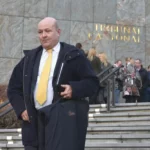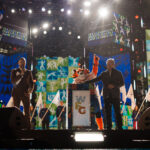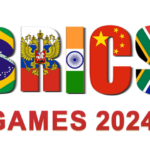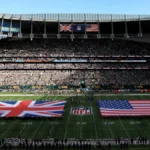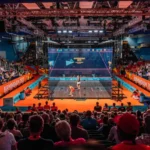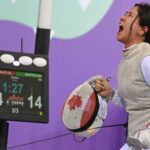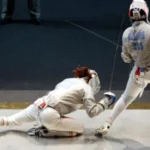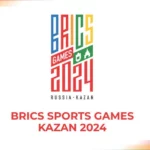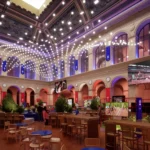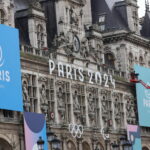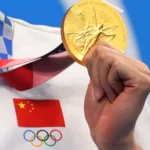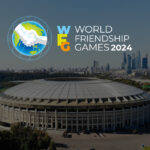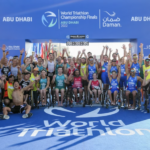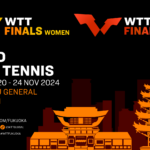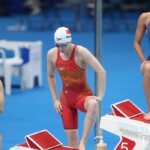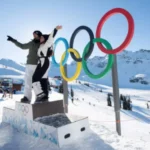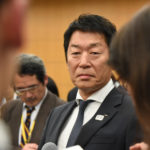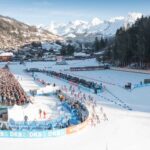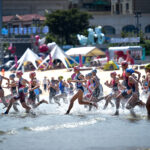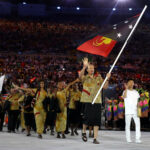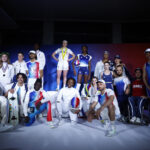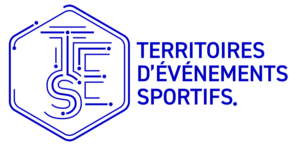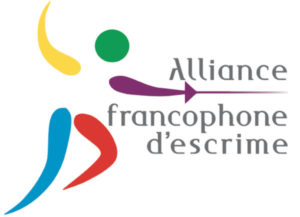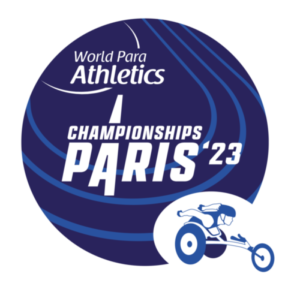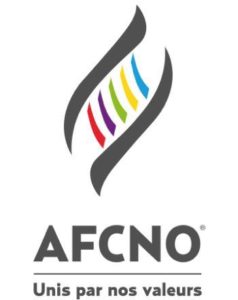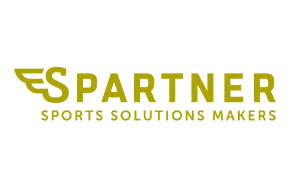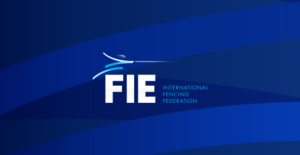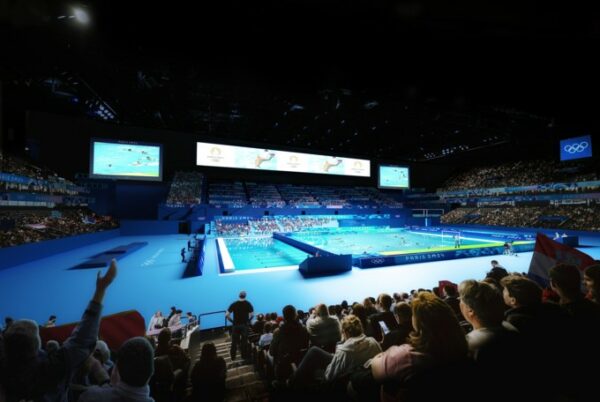
Paris 2024 unveiled this Monday March 18 the first results of its circular economy strategy. Integrated at all levels of the organization, it is structured around three main principles: organizing the Games with fewer resources, better mobilizing them by promoting eco-design and ensuring their second life after the Games. For all equipment, Paris 2024 proposed a more responsible model: thinking about their post-Games life before the Games.
Evaluate the “material footprint” of the Games to better reduce it
Grandstands, tents, beds, chairs, tables, tennis balls, badminton shuttlecocks, flags, bibs… Organizing the largest international sporting event in the world involves a large volume of equipment and the use of numerous resources.
As with its carbon footprint, Paris 2024 wanted to calculate its “material footprint” ahead of the Games, i.e. the sum of the weight of all the resources mobilized for the needs of the Games, a first in the history of the Olympic and Paralympic Games. Site by site, Paris 2024 has carried out a detailed mapping of the resources necessary for the organization of the Games with the objective of reducing and pooling resources, and controlling their life cycle, before, during and after the Games.
To obtain supplies, Paris 2024 applied its Responsible Purchasing Strategy defined in 2019, of which the circular economy is one of the pillars. As part of its calls for tenders, Paris 2024 has therefore favored suppliers who:
- are part of an eco-design approach to their products and services,
- favor rental offers for equipment and long-life products,
- integrate lower impact raw materials such as recycled materials or production scraps,
- are engaged in certification processes,
- offer second and end-of-life solutions for products (reuse, reuse, recycling),
- minimize the use of packaging and promote reusable or recyclable packaging.
To date, thanks to the application of this Responsible Purchasing Strategy, 90% of the 6 million assets used will be deployed and taken over by the providers and partners of the Games who manage a large part of the services necessary for the organization of the Games. The remaining 10% of resources will be under the direct responsibility of Paris 2024, as the Organizing Committee.
Organize an event with fewer resources
At the time of the candidacy, Paris 2024 proposed a concept of more sober Games: capitalizing on 95% of already existing infrastructure or temporary sites, to build less and thus mobilize fewer resources.
This principle of reducing resources is also found in the interior design of the approximately 40 competition and non-competition venues. Tents, chairs, computers, sports equipment or signage… Paris 2024 questioned and shared its needs when possible. This approach made it possible, for example, to go from 800 to 000 furniture items.
Beyond reducing needs, Paris 2024 has favored rental over purchase from event stakeholders. Out of 2 million pieces of sports equipment, ¾ will be rented or made available by sports federations. 75% of electronic equipment such as televisions, computers and printers are also rented, rather than purchased. Finally, with GL Events, Official Partner of Paris 2024 as well as Arena, ES Global and Loxam, Official Supporters of Paris 2024 for temporary infrastructures and their development, 100% of the stands, tents and bungalows will be rented rather than purchased.
In catering, Paris 2024 has committed to reducing single-use plastic by 50% compared to the London 2012 Games. This will result in containers returned to the source, recycled and reused. To achieve this, Coca-Cola, Global Partner of Paris 2024, will favor packaging-free solutions by installing beverage fountains, when the configuration of the site allows it, to significantly reduce the use of plastic bottles.
Better mobilize resources by promoting eco-design
Paris 2024 worked with its partners and service providers on the second axis of its circular economy strategy: promoting eco-design. To dress competition and non-competition venues, install signage or furnish spaces for spectators, athletes and volunteers... the eco-design approach for products is a key evaluation criterion for calls for tenders. Paris 2024.
For the floors for handball, volleyball and sitting volleyball events, as well as wheelchair basketball, wheelchair rugby, goalball and boccia, Paris 2024 chose Gerflor, Official Supporter of Paris 2024 and a French company specializing in floor coverings. The 33.466 m² of sports flooring supplied by Gerflor will therefore contain on average 35% recycled materials and will be 100% recyclable. Gerflor is committed to finding a reuse destination in sports or educational establishments after the competition, for all of the flooring used during the Paris 2024 Games.
For the furnishing of the competition sites, the Athletes' Village or that of the media, RGS Events, Official Supporter of Paris 2024, has sourced certain lots of furniture from companies in the Social and Solidarity Economy sector, with the support of the Les Canaux association as part of the ESS 2024 program. Athletes will find in their spaces coffee tables made from recycled badminton shuttlecocks, poufs made from parachute canvas or even chairs made from recycled bottle caps. As for the athletes' beds, Airweave, Official Supporter of Paris 2024, chose to manufacture the bed bases in France with 100% recycled cardboard, and to recycle them in France after the event.
100% second life for temporary infrastructure, furniture and equipment
By nature, the Olympic and Paralympic Games are an ephemeral event. To prevent the resources mobilized for the Games from turning into waste, but can be reused, reused Paris 2024 thought before the event about the second life of material assets. As with eco-design, Paris 2024 has chosen suppliers who integrate second life into their products.
Sodexo Live!, Official Supporter of Paris 2024, will, for example, ensure the second life of the 35 plates in the Athletes' Village restaurant, produced without a logo to facilitate their reuse. Also at the Athletes' Village, Saint-Gobain, Official Supporter of Paris 000, has developed reusable partitions to allow the transformation of athletes' rooms into accommodation or to be reinstalled on other sites. Materials and temporary structures (tents, stands, bungalows) will be reused, reused or recycled.
The second life of the Games equipment also depends on the legacy that will be given to the sports equipment for the benefit of the territories and the world of sport. The Organizing Committee notably decided to bequeath the temporary swimming pools used during the Games to the territory of Seine-Saint-Denis so that they can benefit the population. Myrtha Pools, Official Supporter of the Games and supplier of temporary pools for Paris 2024, will reinstall the temporary pools of Paris La Défense Arena in Nanterre in the territory of Sevran and Bagnolet/Est Ensemble.


